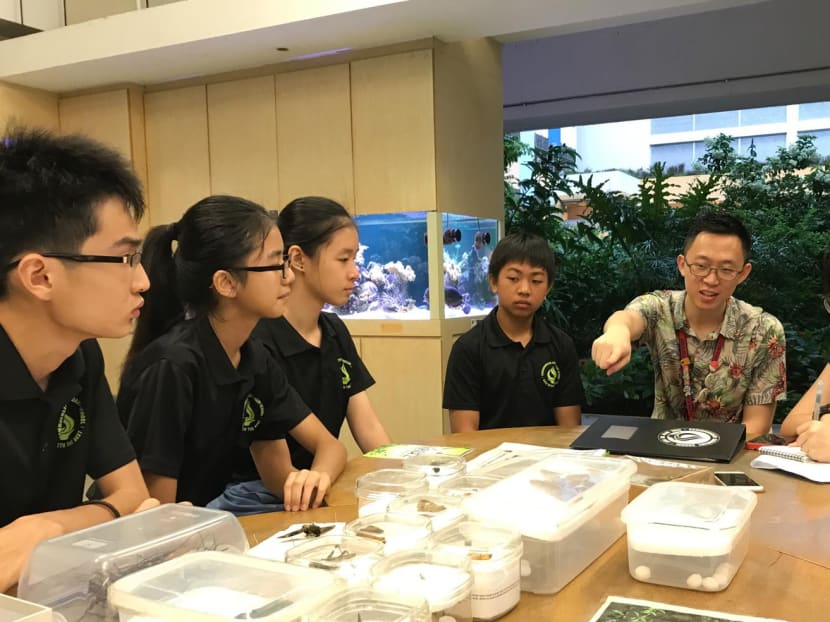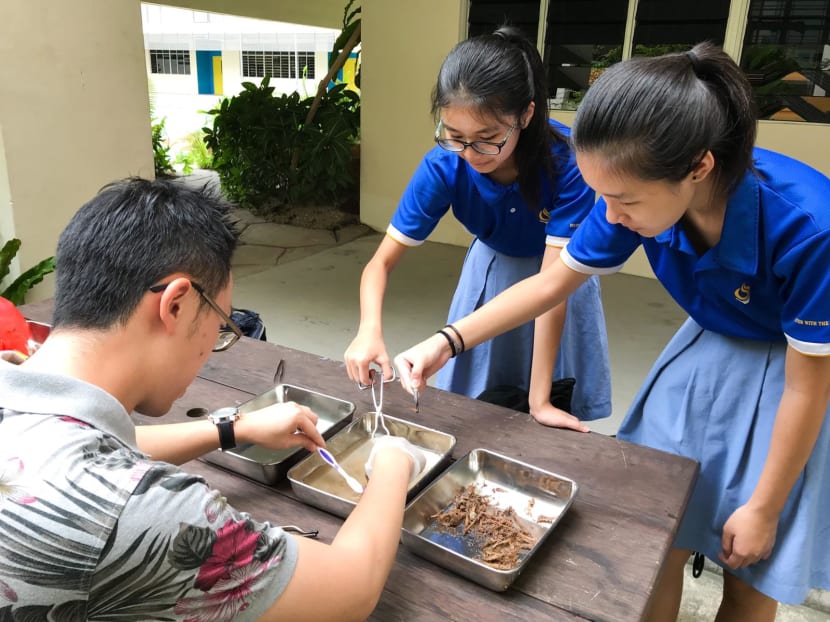Environmental champions lauded for efforts, inspiring others to go green
SINGAPORE — No plastic straws, plastic water bottles or plastic boxes are being sold or used on the premises of Commonwealth Secondary School, thanks to a push by the school’s biology teacher, Mr Jacob Tan Guan Rui.

Mr Jacob Tan (second from right), a biology teacher in Commonwealth Secondary School, was one of 10 winners of the EcoFriend Awards given out by the National Environment Agency.
SINGAPORE — No plastic straws, plastic water bottles or plastic boxes are being sold or used on the premises of Commonwealth Secondary School, thanks to a push by the school’s biology teacher, Mr Jacob Tan Guan Rui.
The drive to minimise the use of plastic was spurred by a conversation that Mr Tan had with his former student, who was aghast by the exorbitant amount of plastic waste he witnessed in schools, especially the polytechnic where he was.
Mr Tan, 33, said: “I wasn’t aware of the issue of plastic waste pollution until, in September 2017, the ex-student came back to look for me and told me (how this was bothering him).
Mr Tan agreed that more could be done in this area and said that he would read up more and see if he could “influence the school community” to support an initiative to cut down on plastic use.
Commonwealth Secondary School now has a campaign that bans plastic products from the canteen since the end of 2017.
On Thursday (July 18), Mr Tan won an award for his effort to carry out this pro-environment project, among other things.
The EcoFriend Awards, organised by the National Environment Agency, were given out to 10 recipients this year under five categories. They are from the private and public sectors, non-government organisations, grassroots volunteers, youth groups and educational institutions.
The awards were introduced in 2007 to recognise pro-active persons who have contributed significantly to environmental sustainability, to highlight that individuals can make a difference in this area.
The winners were also chosen for their roles in inspiring others to do their part for the environment.
Mr Tan, who began teaching in 2010 and won the Ecofriend Awards under the Educational Institution category, believes that people would naturally care for the environment if they appreciate and connect with the natural world.
He is in charge of the school’s Biodiversity e-newsletter that keeps students and staff members updated on the flora and fauna found in school.
He also worked on enhancing natural habitats on the school grounds to try to attract wildlife, and birds such as the Black Bittern and the Jambu Fruit Dove have been spotted there.
“As the eco-habitats are integrated into the environment of the school, students and staff benefit from daily exposure to nature and biodiversity, allowing them to develop a love and greater appreciation of nature,” he said.

Yasmin Sim Su Hui, 19, a third-year student at Ngee Ann Polytechnic’s Business and Accountancy school, was a winner in the Youth & Students category. She told TODAY that she has been enthusiastic about environmental issues ever since her days in Bukit View Secondary School, where she was exposed to such topics in the school curriculum.
Yasmin has been president of the polytechnic’s Business and Accountancy’s Green Club for three years now. She organises annual coastal clean-ups as well as visits to companies for students to learn about the businesses' best practices in environmental sustainability.
“The students that can sign up are business students. So the hope is that through these visits and events, they learn from these corporates and make a difference in the corporate world in the future,” she said.
An example of how lessons learnt in school are carried over in the working life of the individual is Ms Farah Sanwari.
The 29-year-old executive director of Sustainable Living Lab won the EcoFriend Award under the Private Sector category. She has spent the past six years working with the private organisation, which provides sustainable solutions to businesses.
Her contributions are centred around changing consumers’ mindsets to consume less, and organising workshops touching on the circular economy and sustainable development goals.
The alumnus of Singapore Management University said: “Back in university, I questioned how products (are made) and its sustainability.
“I joined Sustainable Living Lab to create sustainable products and to get product designers — who tend to design products with very short life spans — to change.
“I thought that something has to happen in the (manufacturing design) industry. Most electronic products such as phones are meant to last for about two years or even shorter. They call this planned obsolescence.”
Miss Sanwari emphasises that the ecosystem has many parts.
“People tend to think (of sustainability) as ‘an environment thing’. It also involves the communities that you work with. There is a lot of injustice that happens along the value chain —child labour and hazardous workspaces. Businesses need to be called out on these.”









